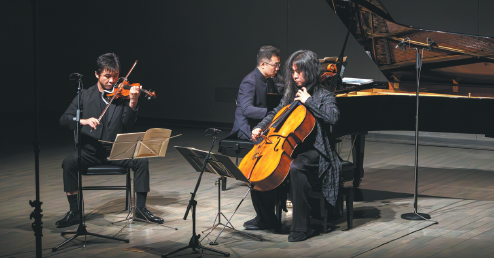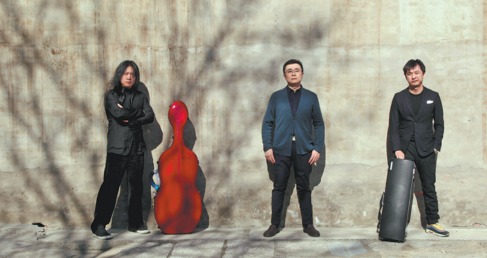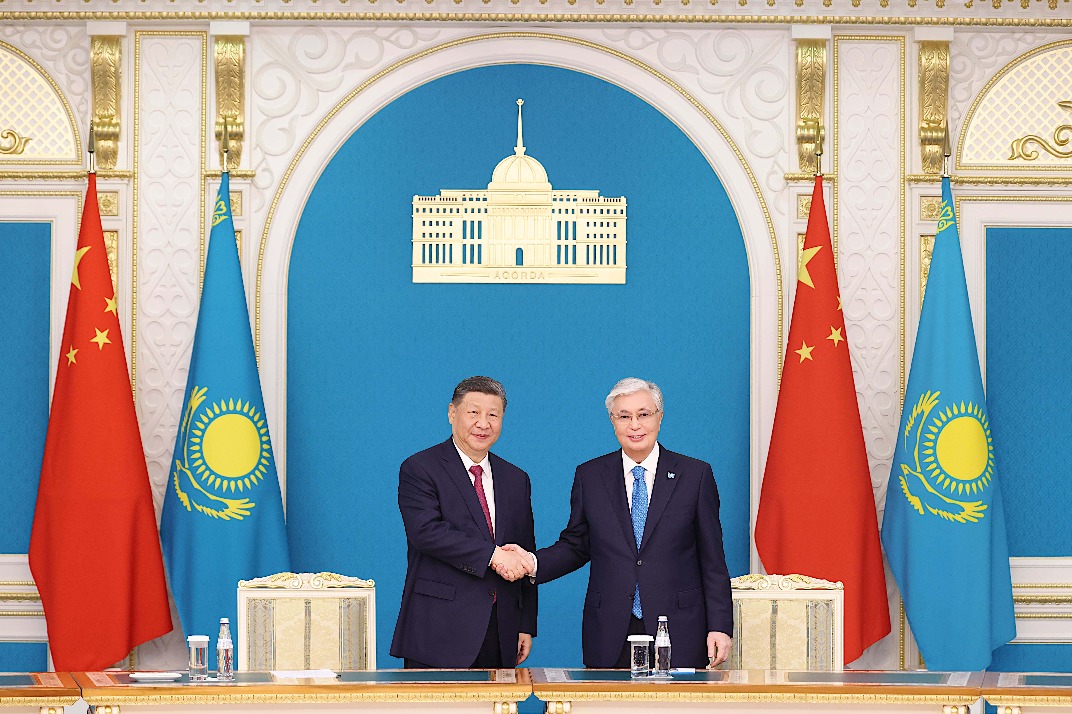Classical act has success in its DNA
Two decades after forming the group, musicians set to celebrate with works by Beethoven, Chen Nan reports.

More than 20 years ago, three musicians in their 20s — graduates of the Central Conservatory of Music in Beijing — enjoyed spending time together as close friends. Then, during one seemingly ordinary dinner, everything changed.
On a whim, they decided to form a trio — a spontaneous spark of a musical dream was ignited around that table. No one knew if it would fade or flourish. But that impromptu decision marked the beginning of a musical journey that has now lasted for two decades.
Today, they are known as the DNA Trio — one of China's most acclaimed chamber music ensembles — comprising pianist Zhang Jialin, now a professor at the Central Conservatory of Music; violinist Zhang Jingye, also a faculty member at the conservatory; and cellist Song Zhao, an independent artist.
This year, as the DNA Trio celebrates its 20th anniversary, the musicians return not only to the stage, but also to the roots of their artistic identity. From Saturday to Aug 9, the trio will perform one concert each month, systematically presenting all eight of Beethoven's piano trios.
The performances will take place in the evocative setting of Tianjin's Anglican Art Centre — formerly the Anglican Church, a historic building constructed in 1903 by British Sinologist and architect Arthur Christopher Moule.
This anniversary concert series is both a tribute to Beethoven's enduring legacy and a personal reflection on the trio's beginnings.
"We chose to perform Beethoven's piano trios to mark our 20th anniversary because, when we first formed the trio in 2005, the very first piece we performed on stage was Beethoven's Ghost Trio," says Zhang Jialin.
The Ghost Trio refers to Beethoven's Piano Trio in D Major, Op 70, No 1, composed in 1808.
"We used to joke back then that one day, we'll play all the Beethoven trios. I never thought we actually would," the pianist adds.
Violinist Zhang Jingye recalls: "When we first came together to play Beethoven, we were shocked by how difficult it was. We argued in every rehearsal — so much that we even questioned whether the trio should continue. Yet, here we are, 20 years later. It was Beethoven who brought us together and has kept us together ever since. His music holds extraordinary significance for us."
Before the upcoming shows in Tianjin, the trio also staged the Beethoven's piano trios at the Peking University in March and April, as part of the 20th anniversary series.
When the trio formed in 2005, they chose a name that was both playful and prophetic: DNA Trio. It wasn't about biology — it was about connection. They felt they shared a kind of musical DNA, a common artistic instinct, even though they were three distinctly different individuals.
Their shared journey traces back to childhood. In September 1988, Zhang Jialin and Song Zhao met in a classroom at the affiliated primary school of the Central Conservatory of Music in Beijing. In September 1990, Zhang Jingye entered the same school, continuing the thread of their intertwined musical paths.
In March 2005, the three came together in Room 317 of the conservatory's practice building to rehearse a Beethoven trio for the first time. On April 24,2005, they made their performance debut with Beethoven's Ghost Trio. A month later, they gave their first full concert — an all-Beethoven program at Tianjin Normal University.
"Setting aside our basic emotional bonds as classmates and friends, the most defining trait we share is a sense of grounded simplicity," says cellist Song.
"That's what allows the DNA Trio to maintain a rare kind of purity in our approach to music."
Zhang Jialin says: "If a string quartet seeks fusion, then a piano trio aspires to mutual brilliance — coexisting without sacrificing individuality. Even though we're three very different people, there's a deep resonance among us — a natural, intuitive connection that allows us to blend and create expressive, cohesive music together."
He recalls that in 2005, when the trio was founded, chamber music had yet to find a wide audience in China. Outside music conservatories, both the market and general public had limited exposure to the genre.
Striking a balance between artistic integrity and market appeal was a major challenge in their early days.
But over the past two decades, with increased government support and the rise of new concert venues, China's chamber music scene has gradually flourished.
Public understanding of the genre has transformed. More concerts are being staged, audiences are becoming more musically literate, and appreciation for classical repertoire continues to grow.
Throughout this journey, the DNA Trio has also cultivated a devoted fan base.
Many of the listeners who first discovered them in their youth have since grown up, started families, and now return to concerts with their loved ones — continuing to support the trio across generations.



Today's Top News
- Xi calls on China, Tajikistan to expand scale of bilateral trade, investment
- Xi says China-Kyrgyzstan cooperation holds great potential
- Xi meets Uzbek President Shavkat Mirziyoyev
- Xi meets Turkmen President Serdar Berdimuhamedov
- Xi meets Tajik President Emomali Rahmon
- Xi meets Kyrgyz President Sadyr Japarov





























